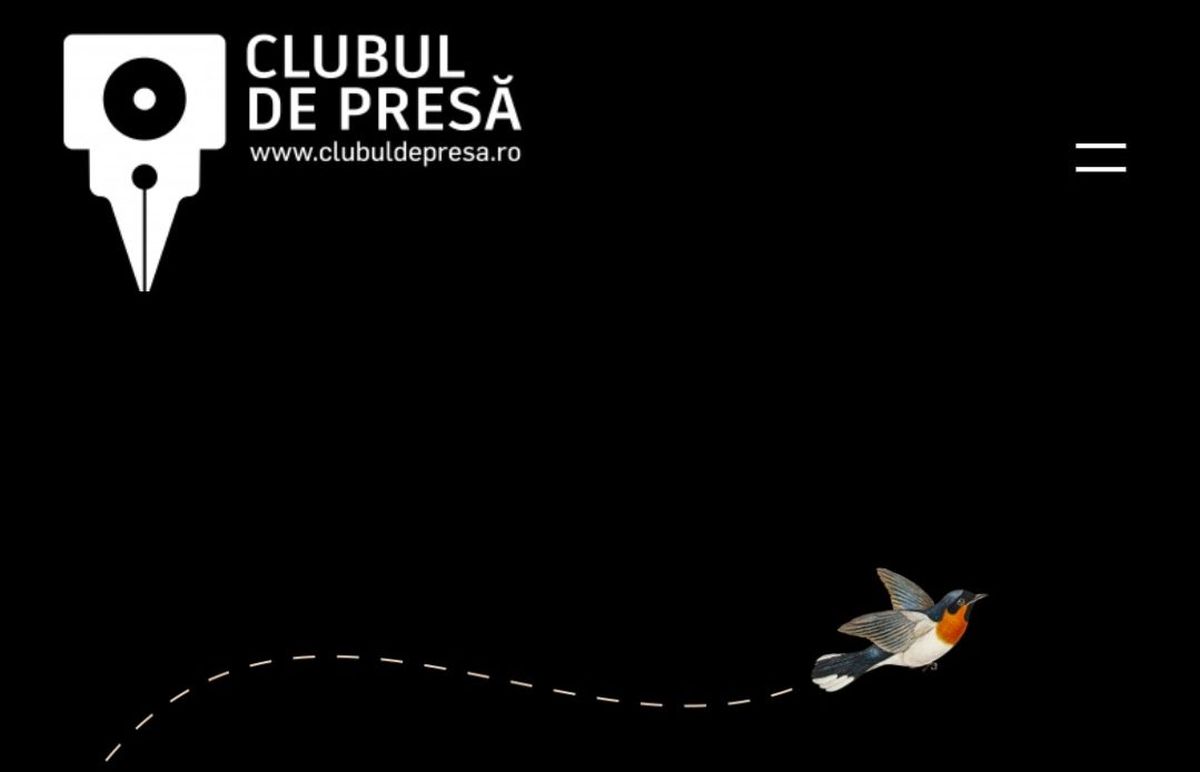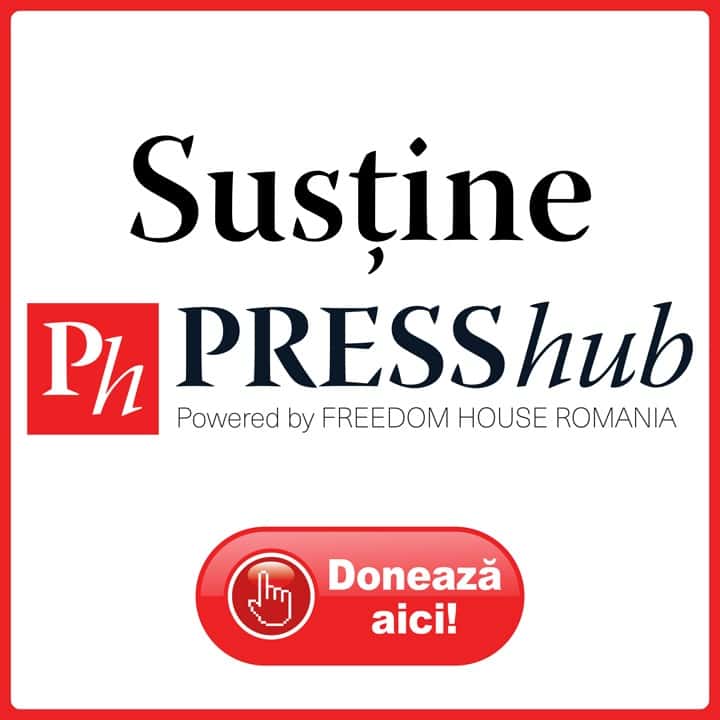Last year, on May 3rd, the World Press Freedom Day, the official launch of the Press Club took place at the Crowne Plaza in Bucharest. According to some statements by the founders, the initiative to establish the club belongs to Maricel Păcurariu, owner of the Realitatea Plus TV station and a businessman with a criminal record.
The idea was realized by a group grandiosely self-styled as the „Gold Thinking Club,” centered around Gold FM radio. Among the members were Cozmin Gușă and his son, Sorin Roșca Stănescu, Răzvan Savaliuc, Iosefina Pascal, Răzvan Dumitrescu, and Marius Ghilezan. The founders claimed that by that date, the organization had gathered over 500 journalists and media entities as members.
The initiative was publicly presented as an urgent action to defend press freedom in Romania against authorities who „trample on it”. The stated objectives included the fight against the National Audiovisual Council (CNA), described as a „catcher”, and against „Sorosist” journalists.
The speeches at the event did not shy away from the expected terminology: ethics, honor, unity, values, freedom. Mihai Rusu stood out by redefining the „fourth estate”, symbolically the press, as the „fifth estate”. The former voice of Radio Free Europe from Munich painted a belligerent picture of the future relationship between this „fifth estate” and the authorities:
„I believe the Press Club’s mission should be, for all of us here, to make ministers, the president of the country, and the head of government tremble before us when we speak with them, and not the other way around”.
The association is registered in the National NGO Register under number 1537/A/2023 as the New Press Club, headquartered at 20 Frumoasă Street, the location of Păcuraru’s companies. The new-old distinction refers to the old media employers’ association, known as the Romanian Press Club (CRP), founded and registered under number 1250/A in 1998, but inactive for several years.
Does CRP still exist?
Indira Crasnea, the last president of CRP, stated that the organization exists, but eight years ago, its members decided to freeze its activities. Regarding the similarity of names, the journalist opined that „they probably used the name of the Romanian Press Club because it was memorable and had notoriety”.
There are other obvious similarities. „Moreover, the internal organization ‘was inspired’ by CRP”, the journalist added with a note of irony.
The intention to replace the Romanian Press Club was evident in the statements of the founders of the Press Club. As early as last winter, there was public talk about the „revival” of CRP, without any legal connection between CRP and the current Press Club. A few current members were also CRP members in the past, but this does not justify perpetuating the confusion.
Cozmin Gușă stated on Radio Gold FM that he had tried a few years ago to unite the owners of news TV stations in a press club. He traveled to Belgrade to ask the fugitive Sebastian Ghiță for approval for RTV, but the plan failed.
Thus, the consecration of the Club on May 3, 2023, was considered a revival of the old club and was enthusiastically announced on Realitatea TV: „A historic day! We mark the rebirth of the Press Club in Romania”.
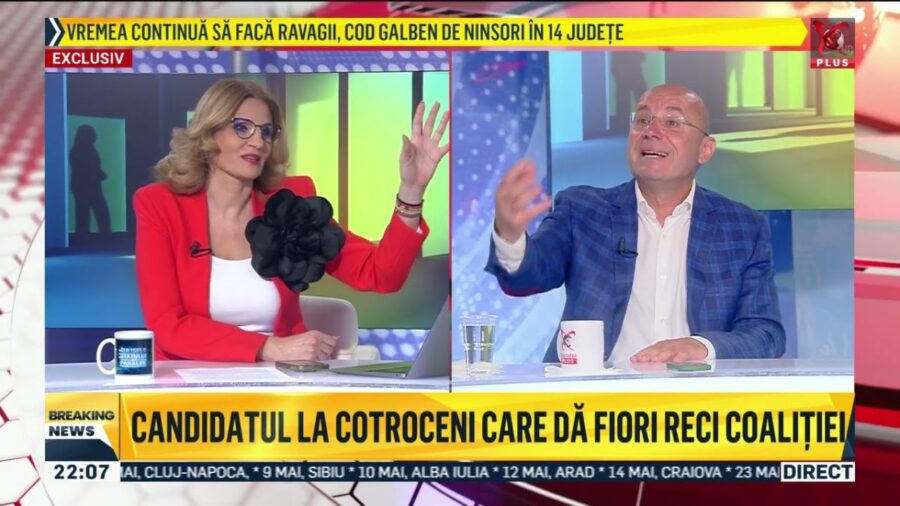
Anca Alexandrescu and Cozmin Gușă in a Realitatea TV appearance (Source: screenshot)
The substitution serves to create the impression of a solid, established organization with recognized authority, speaking on behalf of the entire journalistic community.
Ioana Avădanei, president of the board of the Center for Independent Journalism, explained, at our request, that „freedom of association is a right. In the case of the Press Club, the legality is not in question, but rather the probity of its initiators and the respect they can generate in the profession”. There is a possible intention to „legitimize themselves in the eyes of the public and the profession by capitalizing on the history of the Romanian Press Club. It’s all a matter of trust”, added Ioana Avădanei.
Parallel to the non-governmental organization, a company, the Press Club Advertising Agency, was also registered under J40/8832/2023, at the same address as the club.
What unites the members of the Press Club
The hard core of the Press Club vehemently supports a pro-Moscow and anti-Western agenda, disseminating through various channels like Gold FM, Gold TV, SolidNews, ActiveNews, Corectnews, Realitatea Plus, Realitatea.net, RTV, Ziua News, Ziua de Vest, Ziar de Cluj, NCN, etc., conspiracy theories, anti-Ukraine messages, and the imminent victory of Russia, the theory of the Parallel State, the master-servant relationship between Romania and the USA, the decline of the West, the superiority of Orthodoxy, and more.
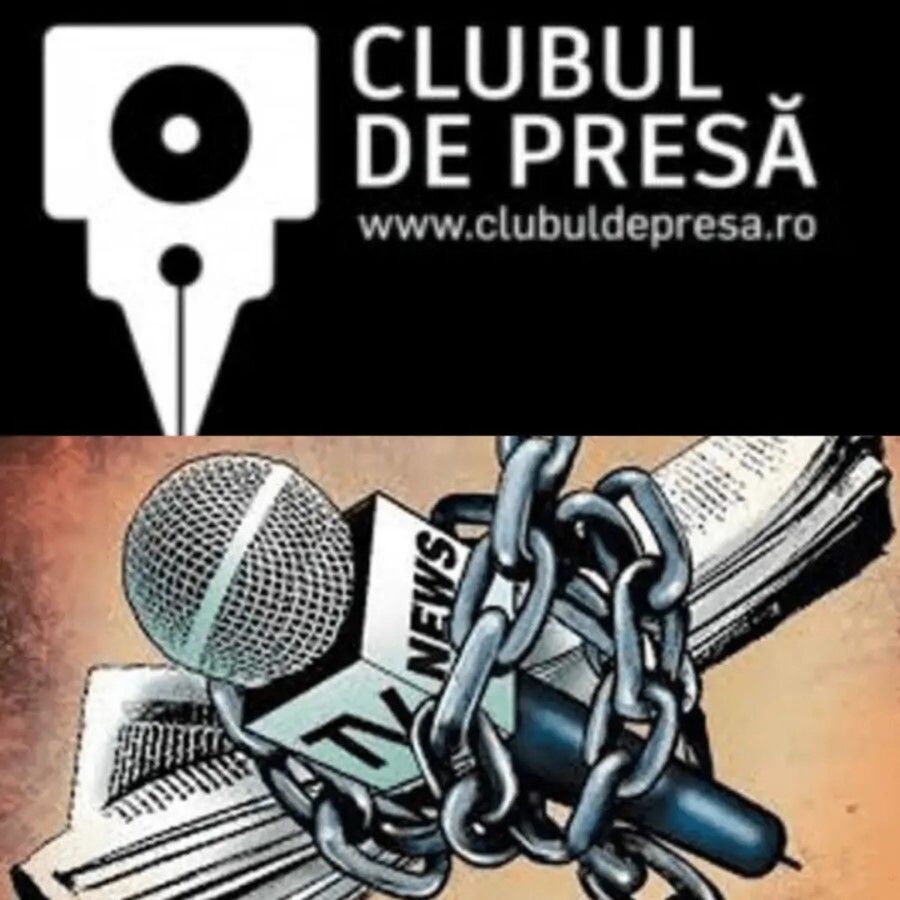
Press Club logo Source: website
Here are some recurring themes that shape the „Goldist” propaganda system:
- Russia will deliver some harsh blows in the near future; the internal public pressure is enormous (Cozmin Gușă)
- Today, both the US and the EU are engaged in a war with Russia, a war that the West is losing (Petru Romoșan)
- Humanity is heading towards de-globalization (Petrișor Peiu)
- The war in Ukraine is not a war for territorial control but a war for a new post-American world order (Adrian Severin)
- Kathleen Kavalec, the US ambassador to Bucharest, although she arrogantly plays the role of a colonial governor, encourages mobsters like Coldea and Dumbravă (Realitatea TV)
- LGBT-ism is a subversive movement that disrupts human nature. In Romania, all major institutions, from the Romanian Orthodox Church to the Government, secret services, and the judiciary, have been penetrated (Cozmin Gușă)
- Romania will suffer greatly if it continues to be dominated by securism; you cannot develop as a SECURISTAN! (Petru Romoșan)
- It is clear that in the Collective West, minorities dominate us, those who consider ourselves normal and the majority. The Satanism propagated from Paris through the Olympics ceremony is an important milestone in the fight against Christianity (Ciprian Mega)
- Citizens in democracies have lost their instinct for freedom, which will be fatal to them (Liviu Alexa)
- Putin, a grand declarative spectacle offered to the international press! The „Russian Davos” dominates the global geoeconomic debate (Daria Gușă)
- The melting of national identities in the EU is being prepared after the European Parliament elections (Petru Romoșan)
An investigation by Iulia Stănoiu in Context reveals the pro-Kremlin propaganda network in Romania, whose media promoters are at the top of the Press Club.
It would be wrong to understand that all those who joined the Press Club are part of a „gang” with hidden common interests and an assumed ideology. The complete list of the 521 journalists „initially” enrolled, which grew to over 700 in July 2024 on the clubuldepresă.ro website, is questionable.
The trick used to give the impression of a massive, representative organization for the entire journalistic community lies in the initial communiqué, which states that „the journalists enrolled in the Press Club are employees of the following companies operating in the Romanian media”, followed by a list of media entities.
We randomly asked a few journalists who appear on the Press Club’s member list if they had signed up:
Sebastian Oancea – Vrancea 24: „I never signed up for any association or club. I didn’t even know I was on a list; I’ll have to check. They probably put me on the list while I was working at Realitatea TV, but that’s not okay”.
Ionuț Jifcu – Reporter 24: „I definitely did not sign up for the Press Club. I’ll write to them to take me off the list; I don’t want to be associated with characters pushing a pro-Moscow agenda. Plus, this could be a personal data issue if lists from newsroom HR departments were used”.
Dan Mircea Cipariu – writer: „I don’t remember exactly, but Bogdan Comaroni, a former colleague at Ziua, called me a while ago and asked if I wanted to be part of the Club. I accepted, but I don’t know what happened after that”.
In other words, journalists, for whom a separate department from the owners was announced, were enrolled en masse along with the company.
Joining an association is done voluntarily, as a personal choice determined in the case of journalists by the organization’s status, purpose, and ethical code. The conditions under which enrollment takes place are unknown, as the statute is not available on the website.
Of the 41 media companies included in the list from May 3, 2023, some indignantly withdrew, illustrating the deep rifts between some owners and the leadership of the Press Club—divergences that are not necessarily ideological or principled but probably stem from old business conflicts. B1TV, Romania TV, Editura Evenimentul Zilei și Capital, Antena 3, Romania Liberă, Academia Cațavencu, Casa mea, Cetățeanul, and Economica requested removal from the list. „You can’t join an association through the air, by spores, but by respecting the legal statute”, commented Dan Andronic, owner of Evenimentul Zilei.
The latest uncertainties concern the affiliation of the Adevărul media group. I asked Cozmin Gușă, founder and member of the Honorary Council of the Club, about the situation and how the affiliation process works: ”I wasn’t responsible for formalizing Adevărul’s entry into the Press Club, but Maricel Păcuraru and Cristian Burci, who negotiated together and made the public announcement, confirmed it to me. With this, I’ve also answered the other question”.
From Gușă’s response, it’s clear that the Realitatea TV owner is conducting negotiations on behalf of the Press Club.
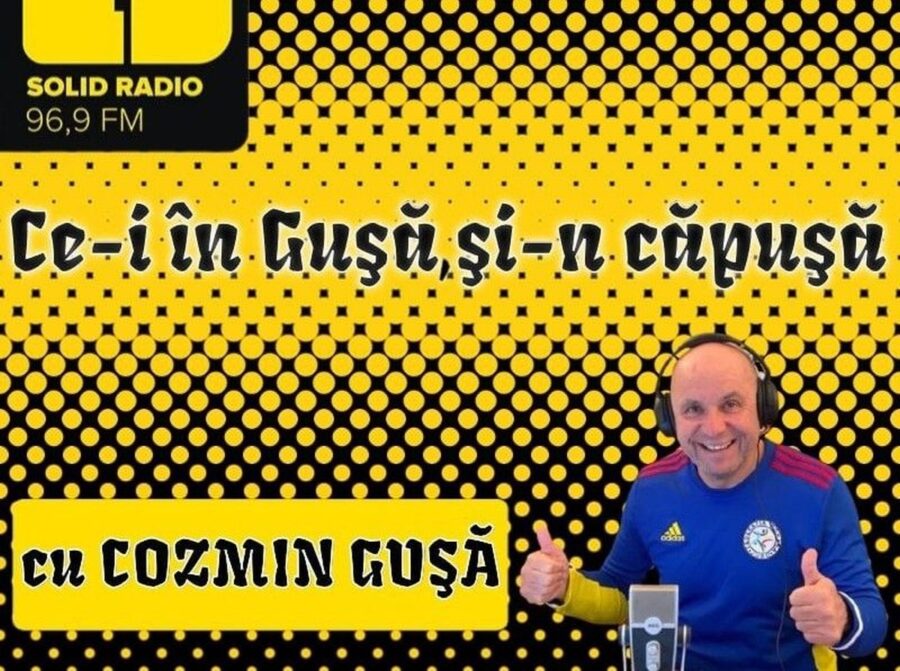
Promotion of the program Ce-i în Gușă și-n căpușă Source: site Solidnews
The founders of this organization share a common goal: controlling the media landscape. Most of the Press Club leaders have a history of political affiliations, political subservience, and lost battles and positions that once granted them power and authority. The Club, under the guise of being a broad journalistic enterprise, provides them with an additional voice.
Gușă’s announced but later withdrawn presidential candidacy, negotiations with “sovereigntists”, and the adamant defense of Putinism under the guise of freedom of expression suggest the organization’s instrumentalization.
Radio Gold FM and Gold TV employ tricks to bypass the law: despite Article 68 of the Audiovisual Code, which prohibits candidates or individuals who have expressed intent to run for political office from moderating shows, Cozmin Gușă effectively moderates the show „Ce-i în Gușă și-n căpușă” by being a “permanent guest”, thus leading the show and its guests. If the National Audiovisual Council (CNA) imposes sanctions, the Press Club protests in the name of press freedom.
Television and the Press Club could be useful to the owner, Păcuraru, not only for possible attacks and smear campaigns carried out by Realitatea employees but also for attempting to intimidate the CNA and state authorities.
For Maricel Păcuraru, the Club could be a vehicle of influence to expand his media empire by acquiring Evenimentul Zilei and Capital Publishing House or adding 10% of Romprest shares belonging to the National Airports Company to the 43% he already owns, as demonstrated by Mihai Munteanu in the investigation “How Maricel Păcuraru Tries to Hostilely Take Over the Press with Russia’s Propagandists”, published on captura.ro.
The story of trying to acquire Evenimentul Zilei Publishing House is complicated, as the investigation shows. It involves the bribe offered by businessman Buzăianu to former Minister of Development, Elena Udrea. The €5 million bribe included a €900,000 claim that would have given the minister control over the publications. Maricel Păcuraru is trying to take over this claim after Udrea exited the scene.
Maricel Păcuraru’s criminal record includes numerous offenses, from fraudulent bankruptcy and forgery of private documents to money laundering, for which he was sentenced to four years in prison in 2014.
In 1996, he was tried for causing a loss of over 600 million old lei to banks through forgery and fraudulent bankruptcy. The Prosecutor’s Office indicted him in 2015 for money laundering in the Romanian Lottery case. The 2014 prison sentence was for a €4 million loss to the Romanian Post. He was released in 2017.
In this context, local editorial affiliates often represent a potential tool, easily attracted given the absence of real journalist defense organizations. „The failure of associative life,” as Professor Mihai Coman wrote in his book Mass-Media in Post-Communist Romania (Polirom, 2003), makes the journalistic profession one of the most vulnerable.
Unable to control its professional territory and having gone through overlapping crises, the press plunged into a paradigm shift era, completely unprepared, becoming easy prey for politicians who have instrumentalized it. The need for a protective “umbrella”, felt by journalists, is the premise exploited by the founders of the Press Club.
Who are the „Deans of Press Activities”?
Promoted as a major event, the (re)birth of the Club advanced the image of the founders’ excellence, as being the „cream” of Romanian journalism and the „deans of press activities.”
The event even made it to the international press, specifically on the website thediplomaticaffairs.com, which highlights the fight of „two fearless journalists”, Anca Alexandrescu and Cozmin Gușă, members of the Press Club, against the „Parallel State”. The site, registered in Switzerland, belongs to a Romanian, Ovidiu Stănică, a former politician in Bacău. Among the frequent contributors to this „prestigious site” is Daria Gușă, Cozmin Gușă’s daughter. Marius Ghilezan, a voice of the Club’s propaganda, also collaborates.
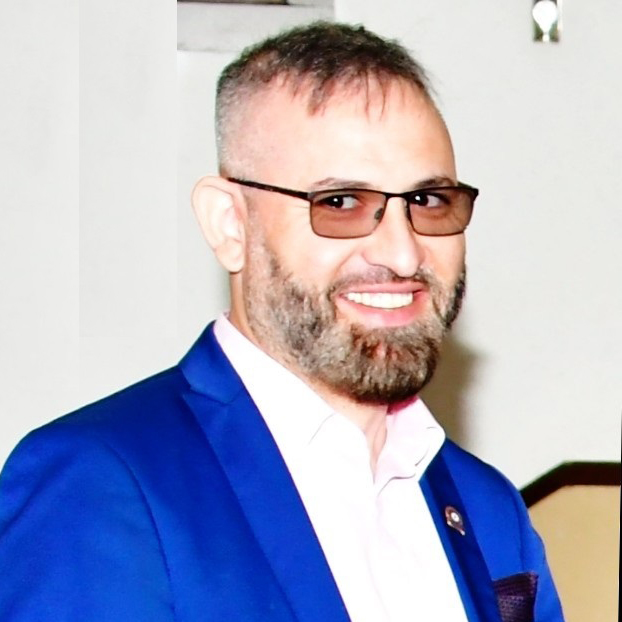
Ovidiu Stănică, owner of The Diplomatic Affairs
From another perspective, the political or criminal past of several members of the Club’s leadership affects the organization’s credibility.
Radio Free Europe: “Some of them have proven legal issues, others have a political history or adhere to conspiracy, anti-Western, and anti-vaccine messages. Additionally, the television and radio stations already affiliated with the Club have been severely sanctioned or fined at times by the National Audiovisual Council (CNA) for ethical breaches”.
Ziariștii.ro : “The cream of the Russophile movement swarming in Romanian publicistics has coalesced on Wednesday, precisely on World Press Freedom Day, into an organization with a misleading name – the Press Club”.
The political connections that propelled them and gave them access to resources are inscribed in the biographies of some of those who currently lead the Press Club.
Cozmin Gușă – Former deputy on the PNL-PD Alliance lists, former PSD Secretary-General during Prime Minister Năstase’s tenure, party leader at the National Initiative Party (PIN), excluded from PSD in 2019, launched as a possible presidential candidate on behalf of the so-called „Gold Movement”. He has media business interests as a shareholder at Realitatea TV/Realitatea Plus. He is also a producer at Radio Gold FM and Gold TV, registered under his son’s name. Praised by Sputnik in 2021.
Sorin Roșca Stănescu – Former Liberal senator, media owner, sentenced to two years and four months in prison for stock market manipulation.
Anca Alexandrescu – Political advisor to Adrian Năstase, Sorin Oprescu, Liviu Dragnea, Victor Ponta, all convicted of corruption. She was Viorica Dăncilă’s right-hand woman and a constant presence in PSD politics. After Liviu Dragnea’s downfall, she reinvented herself as a journalist, hosting the conspiratorial show „Culisele Statului Paralel” on Realitatea Plus.
Răzvan Savaliuc – Former editor at Ziua, he now runs Lumea Justiției (LUJU), specializing in attacks on the DNA and independent magistrates and defending „white-collar” criminals.
Iosefina (Kimi) Pascal – Former member of the PSD youth organization, former assistant to MEP Maria Grapini (PUSL/PSD), recently transformed from a gamer, cosplayer with aspirations of becoming a „fitness model,” into a journalist. She hosts the show „Scamatoriile Iosefinei” on Gold FM and is one of the most strident supporters of anti-vaccine and anti-Western conspiracies.
Claudiu Asimionesei – Owner of Bună Ziua Iași (BZI), a newspaper taken over from his father after the latter was convicted of blackmail. He is indicted in a DIICOT case for fraud. He intends to run as a parliamentary candidate on the AUR Iași lists.
Sarmiza Andronic – Former candidate for the European Parliament on the PIN lists, previously ran for a parliamentary seat on behalf of Sebastian Ghiță’s Romania United Party (PRU), now a political analyst on Antena 3, RTV, and Realitatea Plus.
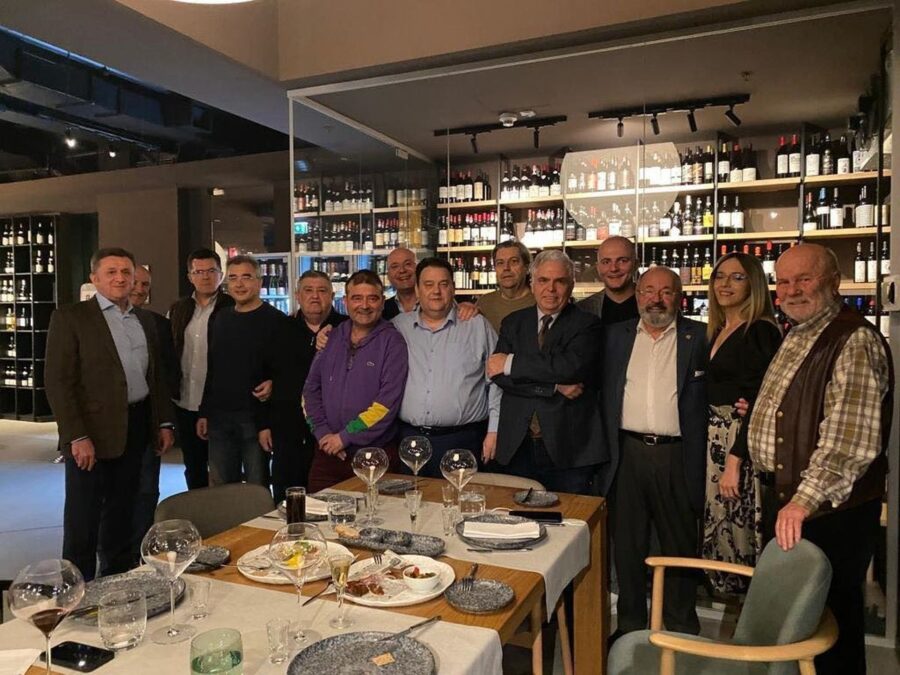
Gold Think Group Source: FB
Whom does the Press Club defend?
Last year, the Press Club leaders promised a free platform to aggregate the journalistic production of members for greater visibility and audience, which was supposed to be measured using state-of-the-art software. These promises have gone unfulfilled.
The statements posted on the site suggest an intimidation policy used to prevent the frequent sanctioning of misinformation, Putinist propaganda, smear campaigns, etc., at Gold FM, Gold TV, Realitatea Plus, and RTV.
False information from Gold FM about Nazi Ukrainians in Romania driving around in limousines lined with weapons led to a record CNA fine of 100,000 lei. Claims by Gold’s network collaborators were published by RAO in the book „The War in Ukraine”.
In October 2023, the Press Club, through AUR Senator Sorin Lavric, called the entire National Audiovisual Council (CNA) to account in Parliament for the „abuses and draconian sanctions imposed on press representatives”. The alleged abuses included, for example, the show by Victor Ciutacu on RTV, a figure known for numerous ethical breaches.
The call went unanswered, although triumphant headlines misled public opinion. For example, BZI, a member publication, headlined: „Entire CNA summoned before Parliament. Members must account for the abuses reported by the Romanian Press Club”. The CNA was never summoned to Parliament at the Press Club’s behest, Mircea Toma, a CNA member, told us.
Last November, the Press Club announced: „We shield journalist Anca Alexandrescu!”, also in a clash with the CNA, which was sanctioning the attack on the rival TV trust owned by Zoltan Teszari, which includes DIGI24.
The attack was sparked by an article by Liviu Alexa, a Cluj press owner and former head of the local PSD, who was also defended by the Club against alleged pressure from Teszari. Earlier, the CNA’s decision to suspend Realitatea Plus for 10 minutes as a sanction for Anca Alexandrescu’s campaign against the Minister of Transport, a subject that could favor Maricel Păcuraru’s assault on Romprest, caused a great deal of unrest.
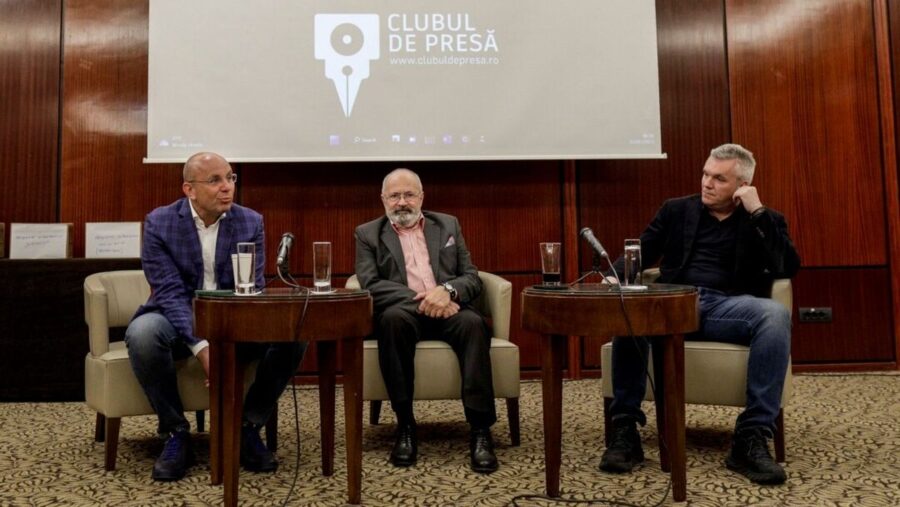
Press Club launch source: FB
Gold FM finds its shield here to protect its political initiatives. „Press Club urges the relevant authorities to immediately stop censoring Gold FM by suspending, blocking or shutting down YouTube, TikTok and Facebook accounts. This totally arbitrary measure, without any legal or plausible motivation whatsoever, was taken simultaneously by apparently different entities and shortly after the idea of Mr. Cozmin Gusa’s candidacy for the position of Mayor General of the Capital was circulated in the public space, a scenario in which he would have been supported by AUR”, the 30 March 2024 statement reads.
The suspension of the Gold FM channel and four other associated channels for allegedly serious deviations, or the sanction for disinformation on Activenews.ro, a website on the same pro-Kremlin line, are denounced as abuses against press freedom.
Even the suspension of the Facebook page of Adrian Severin, a former foreign minister and member of the Goldist group, is considered „exceptionally serious” and is being denounced by the Press Club, where the politician convicted of corruption is not a member.
„Victimization through the Press Club is useful for promotion. Realitatea Plus and RTV are on the top in sanctions, Gold FM, Gold Tv also have more sanctions. CNA has no article in the law to sanction Putinism or Russian propaganda, but there is disinformation that can be sanctioned. For example, allegations that Ukrainians were transporting weapons to Romania in double-bottomed cars or that viruses are being developed in Ukraine in biological laboratories. These must be backed up with data, which they could not. They also lost in court”, explained Mircea Toma, member of the National Audiovisual Council.
The Press Club’s strategy to put pressure on state institutions for the benefit of a small group is becoming visible. Through these vocal strategies in the public arena, the group sometimes even manages to convince European rapporteurs.
The European Commission’s latest report on the rule of law quotes from a Press Club communiqué. The press release was criticizing the CNA for imposing a sanction on the RTV channel and stating that „the CNA shows Stalinist behavior”, a statement quoted in the EC report.
Since the guild does not seem to be the Club’s main concern, denigrating non-affiliated publications and journalists is a regular practice. G4Media and Digi 24 are called „officers of the US Embassy”, the revelations of Emilia Șercan are mockingly baptized „intifada of plagiarism”, other journalists are stigmatized as ” servants of the great vultures”, members of the „Soros network”, „archangels of pain and truth”.
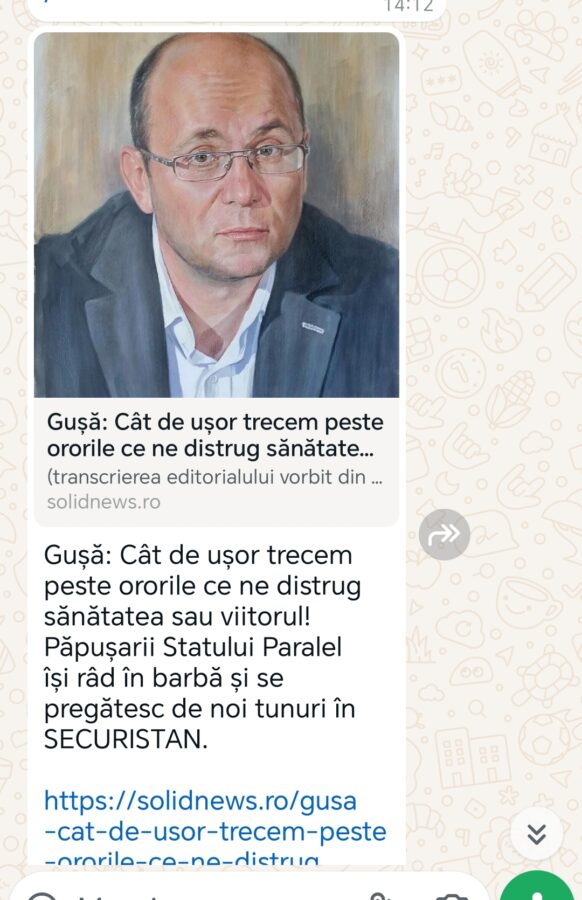
Conspiracies launched on Solidnews Source: Screenshot
The failure of professional solidarity in the Romanian press
Mihai Coman underlines in his study of the Romanian media a paradox that emerged in the process of institutionalization of the press after 1989: the difficulty of gaining and maintaining control over the „professional field” in such a way that monopoly and discretionary control by one group is excluded.
The Press Club has emerged in a vacuum of guild organization, after other forms of association have failed or are irrelevant, making possible imposture, manipulation, and division of the guild for purposes unrelated to the mission of the press.
The media’s weaknesses have cultural roots, believes Professor Peter Gross of Tennessee University, in an interview with Revista 22, a fact proven in his recent book The Cultural Roots of the Romanian Media System (Polirom, 2023).
Peter Gross: „Not politics, not economics, not other things that usually define a system are the main culprits of the state of the media, but culture, values, habits, attitudes, because this translates into practices and here is the biggest problem”.
The political class has managed to capitalize on the vulnerabilities of the press on sensitive issues by buying up the press with large sums of public money. Last year, according to an Expert Forum report, the parliamentary parties spent more than 120 million lei, or €25 million, on propaganda in the press, mostly non-transparent, through various consultancy firms.
„Journalism is probably the most atomized of the professions with some pretence of seriousness – proof of this is the failure of all the associations founded in the last 35 years, with the exception of the self-styled Union of Professional Journalists, in which the quality of professional performance is not important, but other criterias”, Marian Petcu, a press historian and professor at the Faculty of Journalism and Communication Sciences at the University of Bucharest, told us.
The professor was referring to the transformation of UZPR into an organization that distributes receipts for retired journalists in order to receive an allowance. Law 8/2016 included journalists among the creators entitled to receive upon retirement an allowance of 50% of the amount of their pension. Founded in 1990, the union claims without proof to be the successor of the 1919 organization. Declared a „public benefit organization” in 2016, the UZPR says it has more than 4,000 members, including many colonels, spouses of journalists and other members whose professions is clearly not a jurnalistic one. Criminal complaints, lawsuits, internal conflicts have marked the organization’s recent history.
There have been numerous attempts to bring editors and journalists to the same table in the common interest. In 1990, the Society of Romanian Journalists (SZR) and the Association of Romanian Journalists (AZR) were set up at the same time, but they did not last long because of the power struggle of the old communist-era journalists who became influential after 1989. The most stable proved to be the Union of Hungarian-Language Journalists (UZMR), which managed to set up a Council of Honor to sanction ethical breaches.
The Convention of Media Organizations (COM), which brought together 42 media organizations in 2002-2003, was important for the debate on the destiny of the media in Romania. Coordinated by the Center for Independent Journalism and ActiveWatch, COM drafted in 2009 a first Code of Ethics adopted by all the organizations, which, later negotiated with the Romanian Press Club, became the Unified Code of Ethics of the Romanian Press. COM’s actions were diluted to the point of extinction after the project was no longer funded.
The Association of Independent Journalists (AZIR), the Romanian branch of the European Association of Journalists, survived, with a role in defending the independence of the media at European level.
Many other organizations have been born and disappeared for lack of pragmatism and efficiency, leaving the guild prey to fragmentation. The explanation offered by Professor Marian Petcu is „the extremely heterogeneous scientific origin of journalists, sometimes contradictory views about the press and its role, so that sometimes an associative structure crystallized rather on the basis of complicities, rather than on the values and principles of the profession”. The Press Club is the perfect illustration of this description.
Article funded by the GlobalFocus Center through the journalism fellowship program in support of anti-disinformation approaches in media and social media. The views expressed are entirely those of the author and do not necessarily reflect the position of the GlobalFocus Center.
(MAIN PHOTO: Press Club website Source: Screenshot)


